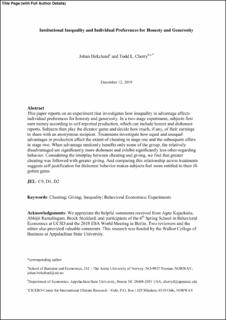Institutional inequality and individual preferences for honesty and generosity
Journal article, Peer reviewed
Accepted version

View/
Date
2020Metadata
Show full item recordCollections
- Journal articles [468]
Original version
Journal of Economic Behavior and Organization. 2020, 170 355-361. 10.1016/j.jebo.2019.12.014Abstract
This paper reports on an experiment that investigates how inequality in advantage affects individual preferences for honesty and generosity. In a two-stage experiment, subjects first earn money according to self-reported production, which can include honest and dishonest reports. Subjects then play the dictator game and decide how much, if any, of their earnings to share with an anonymous recipient. Treatments investigate how equal and unequal advantages in production affect the extent of cheating in stage one and the subsequent offers in stage two. When advantage randomly benefits only some of the group, the relatively disadvantaged are significantly more dishonest and exhibit significantly less other-regarding behavior. Considering the interplay between cheating and giving, we find that greater cheating was followed with greater giving. And comparing this relationship across treatments suggests self-justification for dishonest behavior makes subjects feel more entitled to their ill-gotten gains.